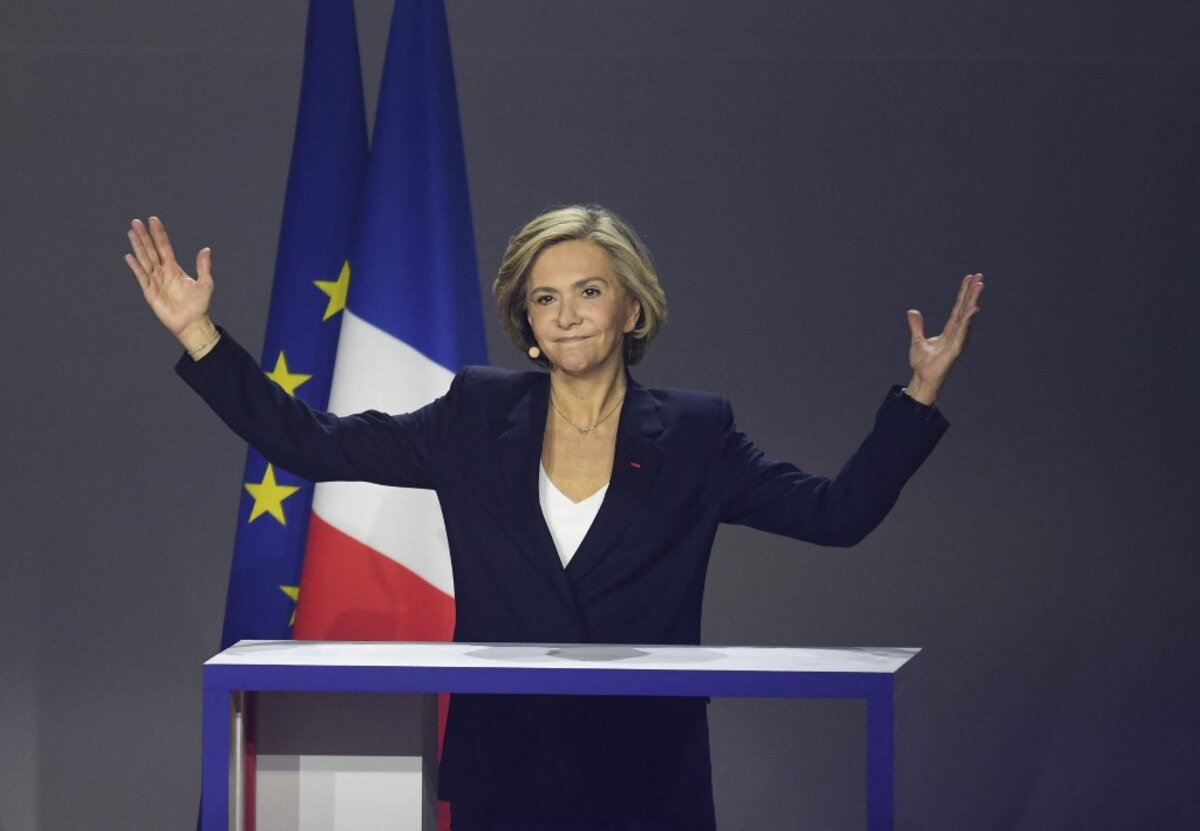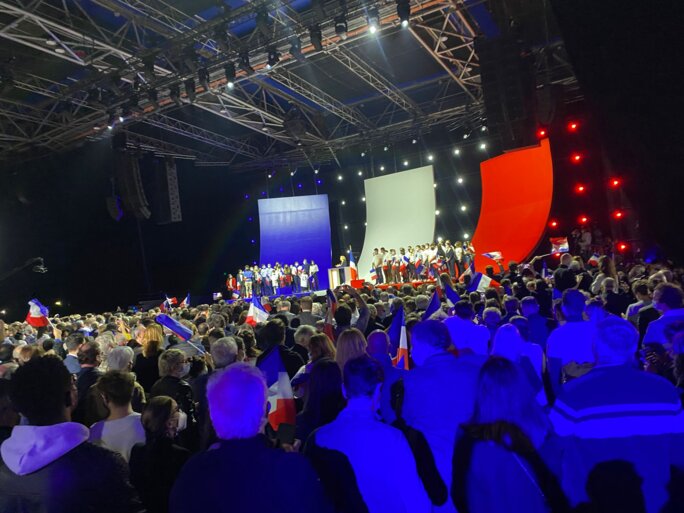The conservative Les Républicains (LR) party presidential candidate Valérie Pécresse attempted in vain to kick-start her stuttering campaign on Sunday with a speech before more than 7,000 supporters who had gathered at the Zénith arena in northern Paris.
Launching the proceedings, LR official and local councillor Geoffrey Carvalhinho somewhat rashly promised the rally that “People will be talking about this February 13th in 20 years’ time!”.
French presidential election campaign meetings often do leave for posterity a key phrase, or slogan, any of which amount to a defining moment, for better or worse. There was Nicolas Sarkozy, campaigning in the 2007 elections, who declared, on the subject of “assimilation” in society, that he himself was “a Frenchman of mixed blood”. Campaigning in 2012, François Hollande pronounced that “My enemy, it’s finance”, a phrase that would come back to haunt him. Then there was former prime minister François Fillon, conservative candidate in the 2017 elections who, engulfed in a scandal of fake jobs for his family and refusing to withdraw his bid, held a defiant rally at the Place du Trocadéro in Paris, where he memorably asked supporters: “Are we alone?”
But at the end of what was billed by commentators as a key moment in her campaign, it was difficult to imagine what Pécresse, 54, would leave behind as memorable, and some 20 minutes after the end of her speech, French rolling TV news channels had mostly moved on to other stories.
The challenge for Pécresse was to re-vitalise a campaign that has been running out of steam, notably dogged by leaked criticism of her from Nicolas Sarkozy, who continues to have significant clout within the LR party, and the defections of several conservatives, including Éric Woerth, a party veteran, former minister and Sarkozy ally, who last week announced he was switching his support to Emmanuel Macron.

Enlargement : Illustration 1

Opinion polls published on Sunday before the meeting that afternoon, placed her sandwiched in the middle of voting intentions for the two far-right candidates Marine Le Pen and Éric Zemmour, and lagging well behind first-placed Macron.
At stake was an outward show of party unity, and in that her campaign managers could claim their only success. Although Sarkozy did not turn up, the front row was lined with party bigwigs, while the crowd at the crammed arena, waving French tricolour flags at every possible moment, excitedly shouted “We’re going to win”.
Opinion polls published on Sunday before the meeting that afternoon, placed her sandwiched in the middle of voting intentions for the two far-right candidates, Marine Le Pen and Éric Zemmour, and lagging well behind first-placed Macron.
Unfortunately for Pécresse, those present at the rally were not representative of France, nor even the French Right in general. Rather, they were the ‘Pécresse Right’, mostly younger and more feminine than the traditional rightwing electorate, and urban, from the Paris region (one large banner held up by party militants proclaimed the 17th arrondissement, or district, of the capital was “with Pécresse”).
In her speech of more than one hour, Pécresse set out the major lines of her manifesto, which resembles a modernised version of that of François Fillon, her roundly defeated predecessor in 2017. She promised cuts in public spending, a new reform of the retirement age and also of unemployment benefits, a rise in working week hours, a massive investment to improve conditions in rural areas, a “radical” decentralisation plan, making a priority of law and order, and the development of a “France of houseowners”.
But she notably addressed an appeal to those in the conservative camp who are now attracted by the unbridled anti-immigration, anti-Islam rhetoric of maverick far-right candidate Éric Zemmour, a polemicist who erupted on the scene last year and who in opinion surveys is now neck-and-neck with the traditional far-right leader and candidate Marine Le Pen. Referring to the far-right notions of a “great downgrading” of France and its middle and lower social classes, and the racist theories of “the Great Replacement” of white European populations and culture through immigration, she declared that “in face of the vital issues” for France, there was “no fatality, neither about the great downgrading, nor about the great replacement”. It appeared less as a rebuttal of such rhetoric and more as an affirmation that she was best placed to deal with the perceived threat.
She also borrowed another phrase from the far-right, that of “documented French”, meaning those immigrants who gain legal or citizenship status. “In face of the nation that splits apart in silence, I lay claim to wanting assimilation, because I want to make people heart-felt French, [and] not only documented French,” she said. She wanted to take back “control of this overflowing immigration that results in the creations of non-France zones”. Marianne, the female emblem of the French republic, she said, “is not a head-scarfed woman”.
To what was otherwise a largely typical conservative manifesto, she added a few personal anecdotes, speaking of her experiences as a woman, and “these humiliations suffered in silence”, while also paying an emotional tribute to her “27 years of love with Jérôme”, her husband, with whom she has three children. She described herself as a “candidate for families”, “the plinth on which everything is based”, adding, “Each time that a couple comes together, that children are born, life is there, stronger than adversity”.
She spoke of her career, and how she became a Member of Parliament against the predictions of the “opinion pollsters” who had her written-off “in advance”. But that was to forget that it was the late former French president Jacques Chirac who personally ensured that she stood for election in a conservative bastion in a constituency close to Paris.
On the future of education – an issue of recurrent political debate in France – she exhorted the audience to “Be indignant, rise up for our schooling!”, while promising to “build an educative nation, that of respect for the teacher, [one] of demands and the equality of opportunities”.
Pécresse repeatedly trumpeted the notion of “a new France” she wants to create (and which, in an interview timely published that morning in the weekly Journal du Dimanche, she said she had spent two months preparing “brick by brick”). She wanted to recover “the grandeur of France”, she told the audience, one of “audacity and hope”, promising to install a “national reconciliation” and the “courage to do”. Borrowing from Fillon the pledge to expose the “truth” about public finances, she also re-hashed Sarkozy’s homages to the “France of roundabouts and the early metros”, an allusion to ordinary working folk.
On the subject of ecology, she echoed the style of Marine Le Pen, the other far-right candidate seeking to poach a slice of the conservative electorate. “To love France, is to love its nature,” Pécresse said. “Our landscapes are unique, magnificent, inspirational. They who love their country protects it, they pass it on, like one passes on a treasure.”
Pécresse had no intention of renewing the ideological vision of her political camp, rather she sought to give the reassurance that she could unite it to win the election. But her performance was lacklustre, and she struggled to bring vitality to the text she read from two Autocues, sometimes over-stressing the last syllables, earnestly staring into the cameras when wanting to give gravity, all of which gave the impression of over-dramatizing. Fortunately for her, several hundred young party militants were strategically placed around the audience, breaking into chants of “Valérie president!”, and “Macron in Touquet, Valérie in the Elysée!” – a reference to the house that Macron and his wife Brigitte own in the northern French town of Le Touquet.

Enlargement : Illustration 2

“I am this indomitable French woman,” declared Pécress. “Nothing will stop me.” But while the groups of excited militants cheered on their feet, the atmosphere was hardly euphoric. Even during the highlights of the speech, some in the audience remained seated, half-heartedly twirling French flags while others tapped away on their mobile phones.
In the closing moments of the meeting, LR party bigwigs climbed onto the stage to join their candidate in a show of approving unity. At the exit, Mediapart came across one of them, who just moments before had been enthusiastically applauding Pécresse, and asked for his opinion of the rally. “Frankly, as for the style, it was crap,” he bluntly replied.
-------------------------
- The original French version of this report can be found here.
English version by Graham Tearse


